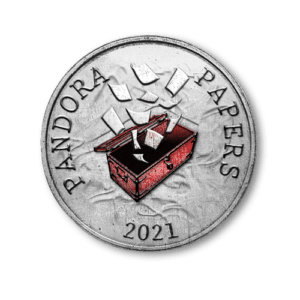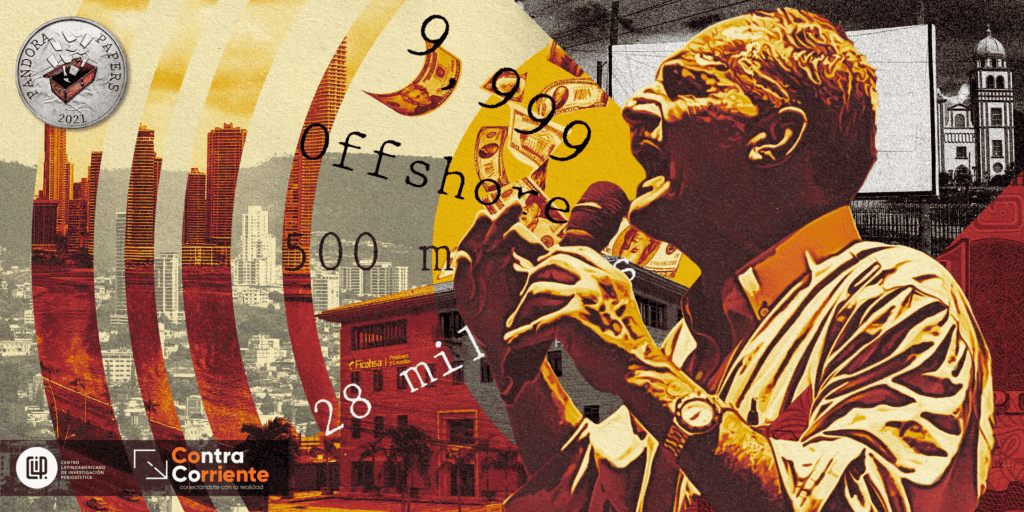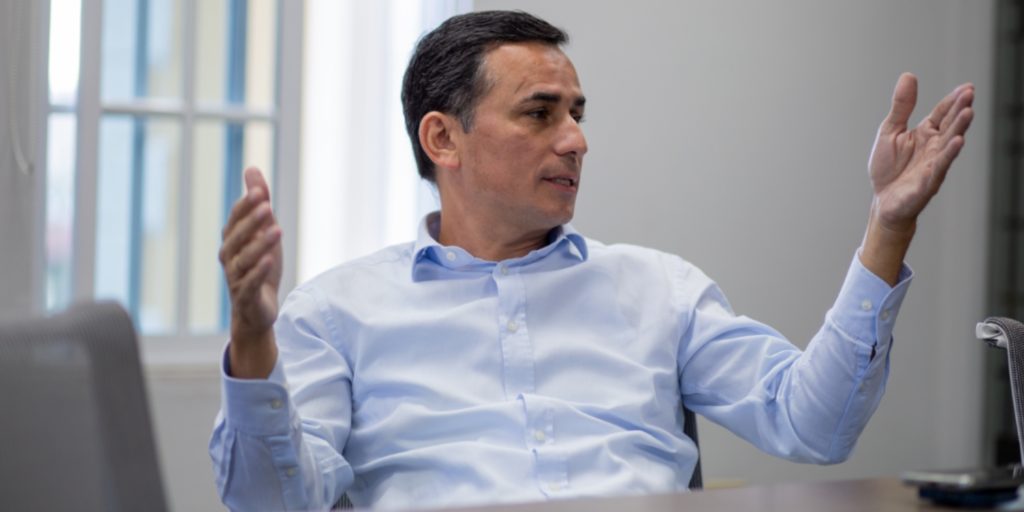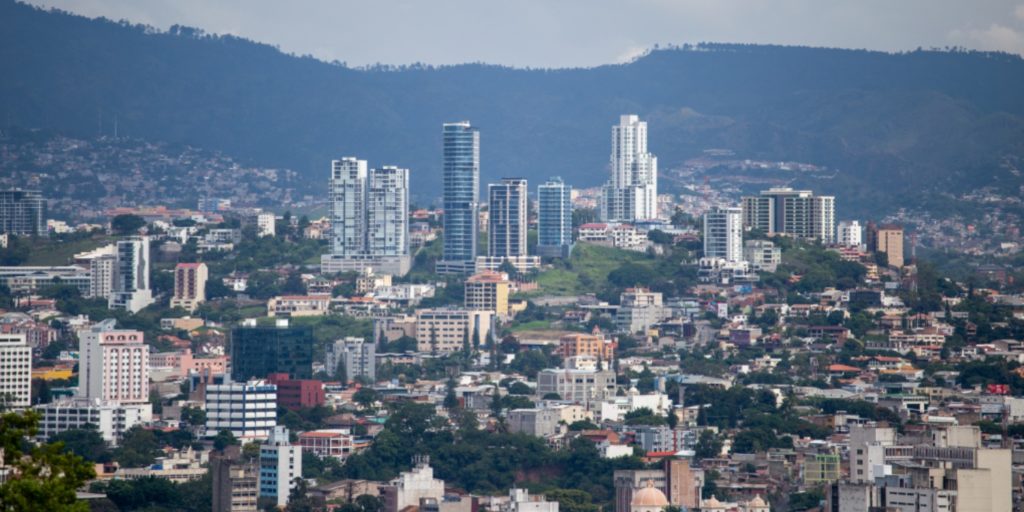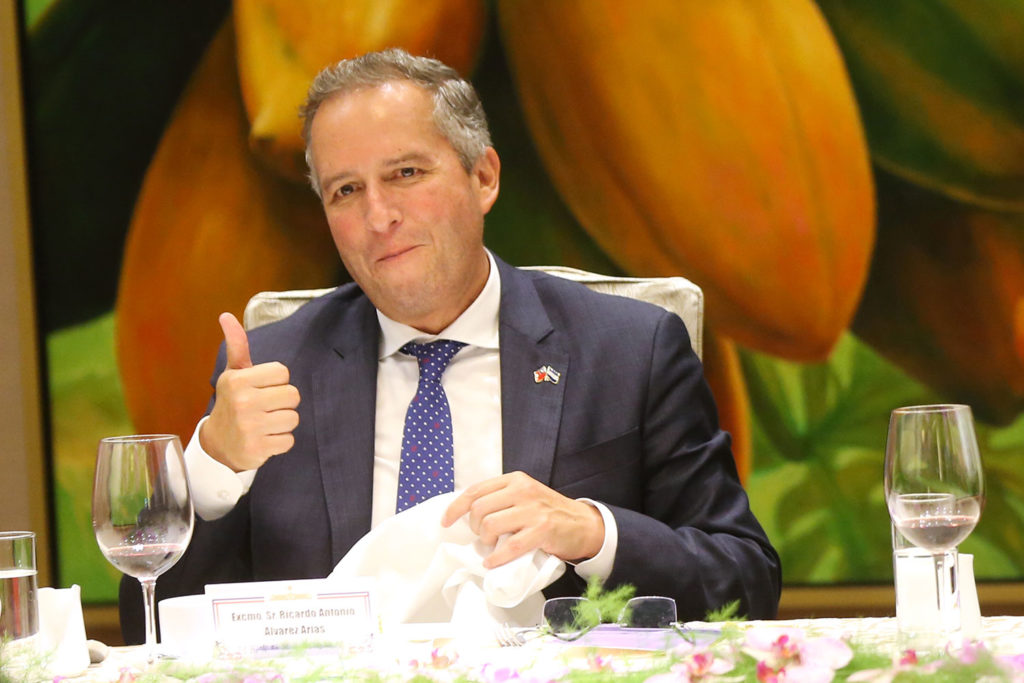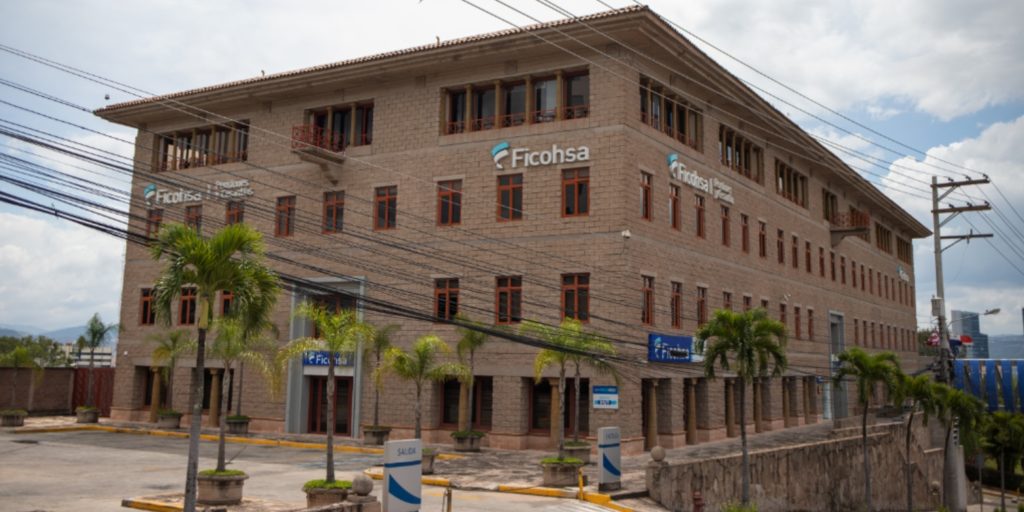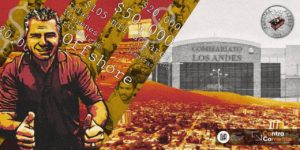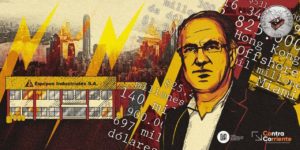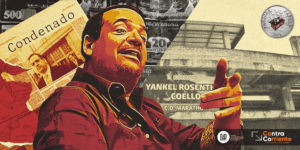Current mayor of Tegucigalpa and popular presidential candidate Nasry Asfura, and former mayor and current vice-president of Honduras, Ricardo Álvarez, managed offshore companies in Panama while in office. The revelation is particularly important considering they have both been investigated for alleged embezzlement. So far neither of them has offered explanations for the offshores.
Jennifer Avila, Andrés Bermúdez Liévano & María Teresa Ronderos*
Illustrations: Miguel Méndez
Photos: Martín Cálix
The last two mayors of Tegucigalpa – who are also two of Honduras’ most prominent politicians – were shareholders in offshore companies in Panama while in office, according to internal documents from a law firm there. In both cases, the incorporation of these companies was facilitated by Honduran bank Ficohsa.
Current mayor Nasry ‘Tito’ Asfura, presidential candidate for the National Party in the upcoming elections and Honduras’ most popular political figure, was a majority shareholder of an offshore company in Panama that later ended up in the hands of members of the prominent Atala Faraj family, owners of the Ficohsa financial group.
His predecessor in the mayor’s office, Ricardo Álvarez, who is currently Juan Orlando Hernández’s first presidential appointee (and, therefore, one of his vice presidents), also appears in documents as a shareholder of another offshore company.
In both cases, the companies were created by Panamanian law firm Alemán, Cordero, Galindo & Lee, better known as Alcogal, and were managed on a day-to-day basis by the same three directors. According to internal correspondence of that law firm, Alcogal notified Ficohsa employees regarding the daily operations of these companies.
These findings are the result of the analysis of thousands of internal documents belonging to several firms that specialize in managing offshore companies in Panama and other countries, carried out by Honduran media Contracorriente and the Latin American Center for Investigative Journalism (CLIP). They are part of the Pandora Papers cross-border investigation led by the International Consortium of Investigative Journalists (ICIJ).
An anonymous source shared 2.94 terabytes of confidential financial records with the ICIJ in separate batches over several months, totaling over 11.9 million documents, from 14 offshore service providers that create and manage shell companies and trusts in tax havens around the world. Named the Pandora Papers, these documents, which date from 1996 to 2020 and are in English, Spanish, Chinese, Greek, Russian and other languages, reveal connections with companies and businesses in more than 200 countries and territories. A collaboration of 618 journalists and 150 media outlets made it possible to investigate hundreds of them simultaneously in 117 countries.
Both politicians – the current vice-president and the current mayor – have been under investigation by the Honduran justice system over the past three years for alleged corruption linked to their actions as public officials. The ownership of offshore companies in itself is not evidence of irregular activities, but the fact that both Asfura and Álvarez were listed as shareholders while being public servants raises questions.
Honduran public servants are obliged to report their economic interests to the state, but these reports are not published and therefore it is not possible to know if they declared these companies to the Treasury, nor what they used them for.
Neither of them agreed to answer this team’s questions regarding these facts.
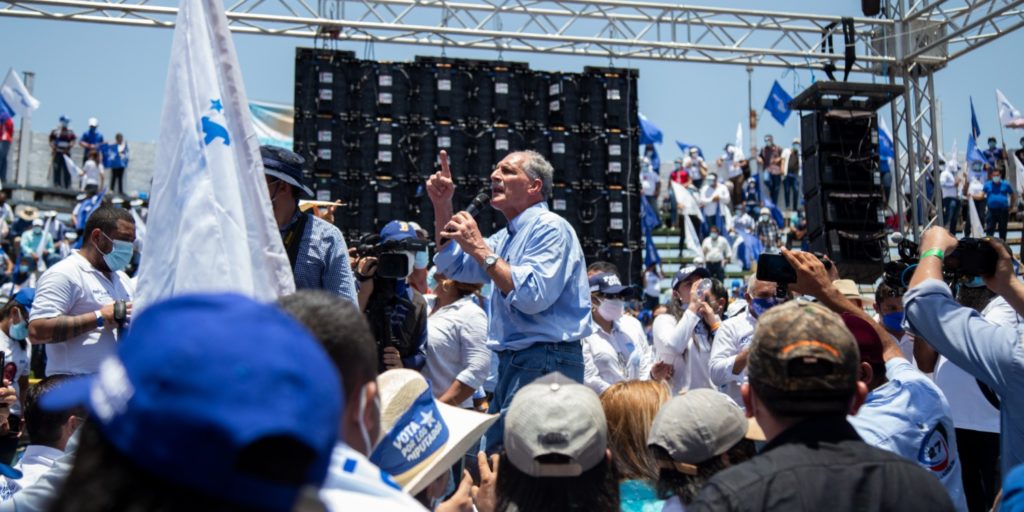
‘Papi’ in Paradise
Nasry Asfura Zablah, a charismatic politician whose campaign slogan is “Papi is different,” appears as the majority shareholder of an offshore company whose existence had not been made public until now. That company, Karlane Overseas S.A., was created in Panama in January 2006, according to Alcogal’s internal documents.
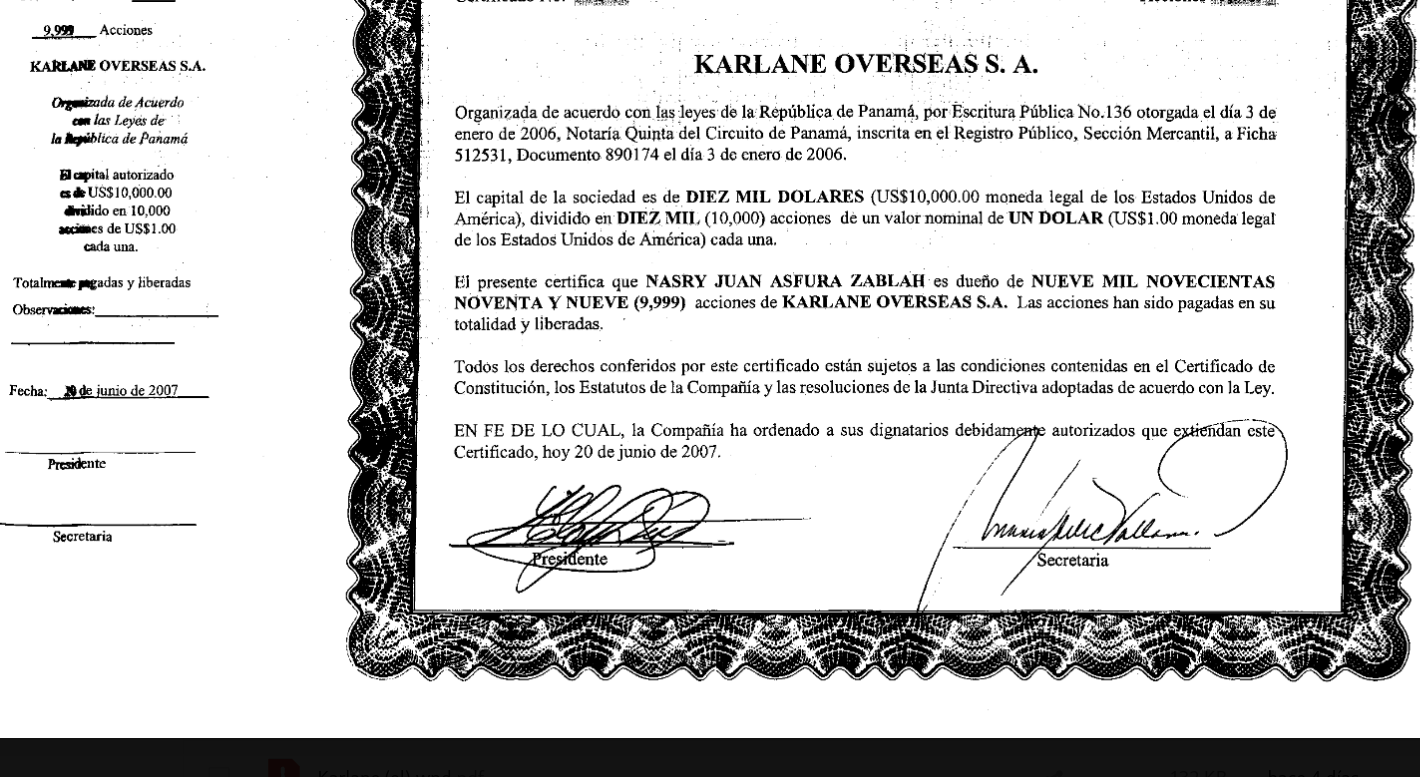
A year and a half later, on June 20th, 2007, the directors of the company – Edgardo Eloy Díaz, Fernando Antonio Gil and María Vallarino, whose names appear in hundreds of companies of the Panamanian firm- decided to cancel Karlane’s two bearer share certificates. According to Alcogal’s meeting minutes, these were replaced with two new certificates, this time under specific names.
One of these certificates, which represented 9,999 of the 10,000 shares of the company, was issued in the name of Nasry Juan Asfura Zablah.
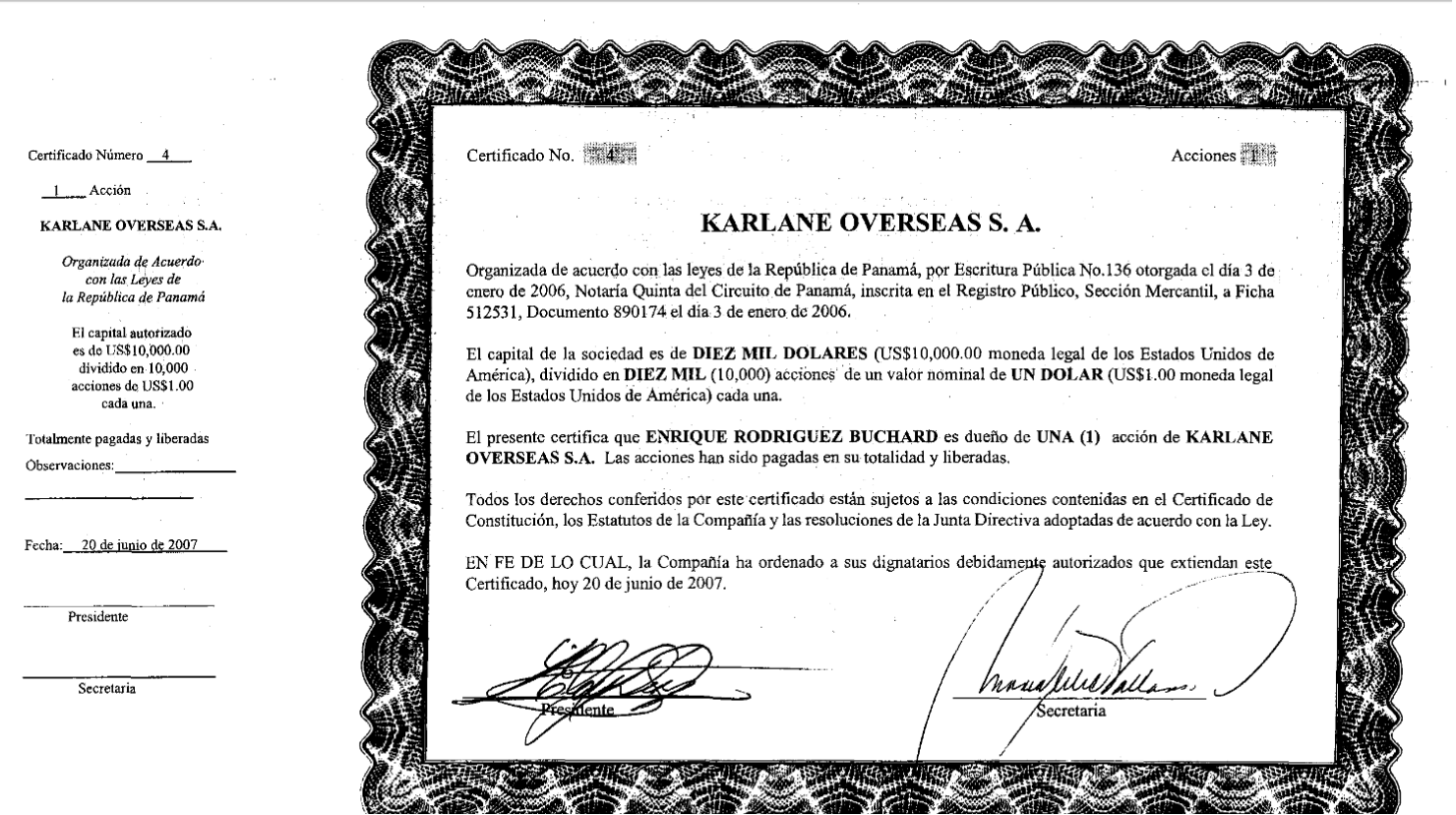
The second certificate, representing a single share, was in the name of Enrique Rodriguez Burchard, a Honduran commercial lawyer from the law firm Aguilar Castillo Love. This lawyer had been acting delegate in the National Congress for the Liberal Party and held a general power of attorney over Karlane in 2006.
Rodríguez Burchard denies having signed any document of the company. In an interview with this journalistic alliance he said that, “In the particular case of this company, what I do remember is that I opened no accounts as a partner nor did we receive any income.”
“I don’t know how many shares I had,” Rodriguez Burchard said. “It was probably a nominal share; that company is Panamanian and we did not create it, and what I can tell you is that I did not receive a single peso from it.” Moreover, days before the interview in an e-mail to this team of journalists, Rodriguez Burchard had written that, “As lawyers, we participate annually in many commercial operations and in some of them we are temporary partners of companies or nominee partners. That is, in order to comply with the legal requirement of having the minimum number of members, we are issued one share per nominal value (meaning USD$1, USD$10 or USD$100)”.
At the time when Karlane’s directors issued the majority of shares in his name, Asfura – who had previously worked as a municipal prosecutor, advisor and manager of public services in the mayoral offices of Nora Gúnera de Melgar and Óscar Acosta – was city councilor in the Municipal Corporation of the Central District.
In the Honduran political system, the councilors are the members of the local legislative body. They are not directly elected by the citizens. Instead, their seats are assigned according to the votes obtained by the parties in the mayoral election. Asfura, who had lost the internal primaries of his party to Ricardo Álvarez, then joined the campaign of the current vice-president and was one of his candidates for councilor for the National Party.
At the same time, Burchard was acting delegate in the National Congress. However, he insisted that, “I have not been a public official, co-religionist, nor co-worker, of the presidential candidate.” In the interview he said that acting delegates are not considered public officials and therefore they did not have to report their assets. If anything, what would need to be reported are transactions or assets, but “if I have a nominal share, I don’t need to report it.”
The lawyer said that Asfura was his friend and that he had never had an account or credit card abroad. “We used to scold him because he doesn’t have a deposit certificate, something happens to him and he will leave his children… who knows how!” said Rodriguez Burchard emphatically. “In thirty-odd years of knowing him, I must have done two legal jobs for him; a transfer, an authentication.” And he assured that Asfura had two or three other lawyers working with him.
The offshore company Karlane – the one that had presidential candidate Nasry Asfura as majority shareholder – was active at least until January 29th, 2018, as confirmed by an annual fee payment receipt from Panama’s Directorate General of Revenue. On that date Asfura had just completed the first year of his second term as mayor of Tegucigalpa. According to the Open Corporates database, it is still active today.
This journalistic alliance requested an interview with Asfura and then sent him an e-mail with questions about his dealings with this offshore company. The presidential candidate, however, did not answer directly; journalist Arístides Aceituno did it on his behalf, referred by Asfura himself, who weeks ago explained that Aceituno was his right hand man and had been working with him for 40 years.
“About your questions, he answered (referring to Asfura), he does not have any type of investment in another country. Everything he has is registered here; he does not know the name of Karlane Overseas, because he does not have any company, as you claim,” Aceituno said.
We insisted to Aceituno on the importance of being able to talk to Asfura directly or that he himself respond by mail or telephone. However, Aceituno said, “He is already answering you in his own way. He has nothing to do with or know what you are asking about, because he has no company. Silence also communicates something. You should have a source or evidence of what you are asking.”
Contractors of Teguciglapa’s government and their ties with Asfura
While being a public servant, Asfura had ties to companies that won million-dollar contracts with the government of Tegucigalpa for garbage collection in the capital.
One of these companies is Cosemsa, in which Asfura does not appear in the records as shareholder or in the board of directors, but as guarantor for the acquisition of a loan for two million dollars with the company Crédito Inmobiliario Jacaleapa, created in 1986. Asfura is listed as general manager of CI Jacaleapa and his sister Mary Ivette Asfura Zablah is listed as general secretary, according to the Honduran commercial registry.
Together with the company AMA de Honduras (Amahsa), Cosemsa obtained contracts between 2008 and 2010 with the local legislative authority, of which Álvarez was one of the councilors, for some US$8 million, according to an audit by the Superior Court of Accounts (TSC). In an interview with Contracorriente on March 21st, 2021, the day of the primary elections, Nasry Asfura said that he did not remember having been a guarantor of a loan for Cosemsa because a long time had passed.
In addition to Cosemsa, the company Sula Ambiente – of which ‘Papi’ was a partner – had a contract for garbage collection in San Pedro Sula, the country’s second largest city.
In the following years, ‘Tito’ Asfura – descendant of Palestinian immigrants who arrived in Honduras at the beginning of the 20th century and son of a businessperson who owned the La Fama store in Comayagüela (next to Tegucigalpa)- built up an increasingly visible political profile. Between 2010 and 2014 he was a National Party councilor for the department of Francisco Morazán, where Tegucigalpa is located, with a brief hiatus when he was appointed director of the Honduran Social Investment Fund (FHIS) by the government of Porfirio Lobo for a year. At the end of 2013 he was elected mayor of Tegucigalpa with twice the votes of his closest rival. Four years later, he was reelected with more than six times the votes. He is now a presidential candidate in the November elections, after having won his party’s primary last April.
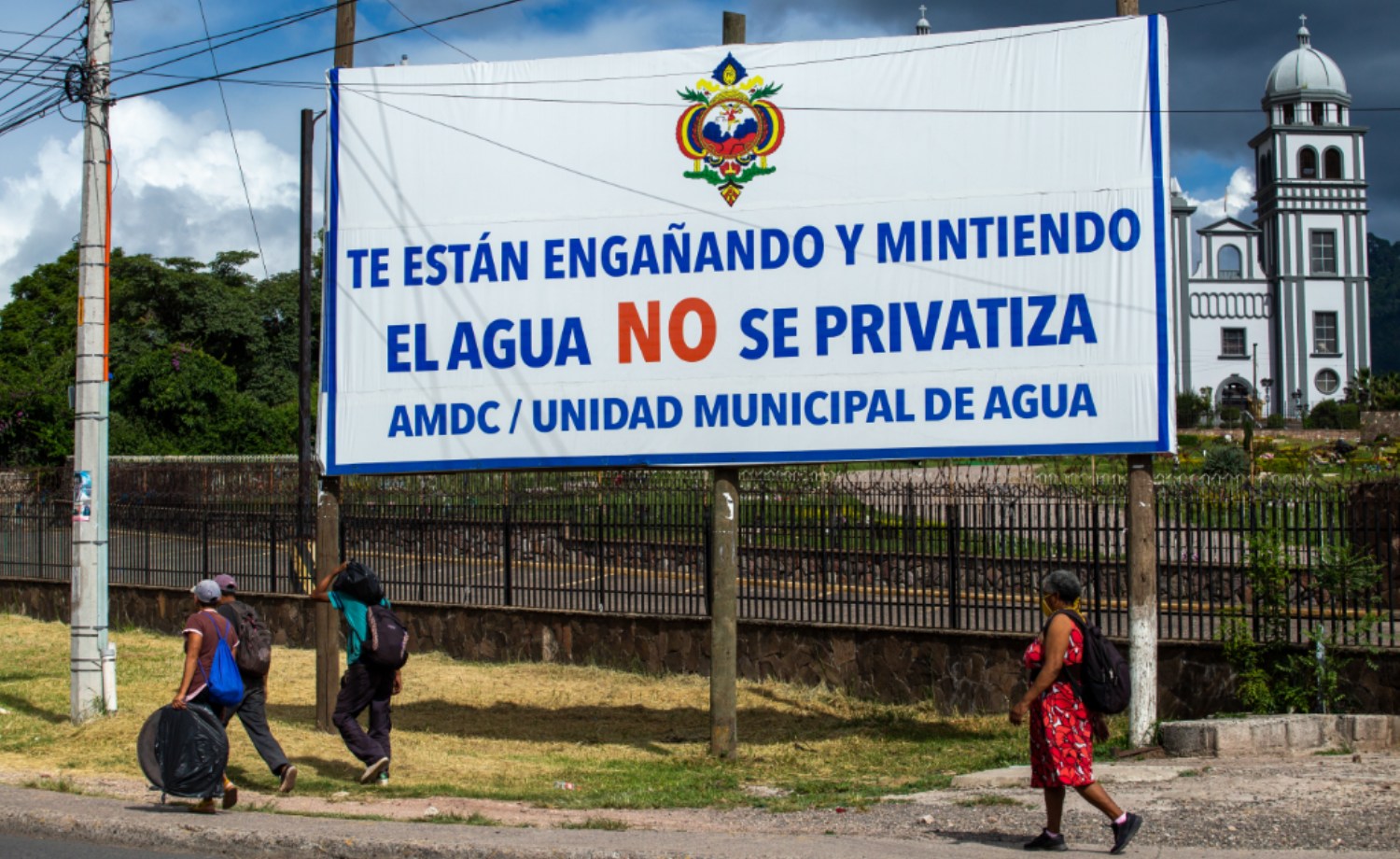
The Offshore VP
In addition to Asfura, his predecessor as mayor of Tegucigalpa, former mayor Ricardo Antonio Álvarez Arias, currently vice-president and first presidential appointee of Juan Orlando Hernández, also appears in Alcogal’s files. He is listed as a shareholder of the company Netplum International Inc. created in Panama by the law firm on August 9th, 2006, six months after the incorporation of the company of which Asfura would later become the majority shareholder. Netplum was registered with an initial capital of US$10,000, according to the notarized incorporation document.
The document lists the same three directors of Karlane: Edgardo Eloy Díaz, María Vallarino and Fernando Antonio Gil.
Alcogal took particular care of this company because one of its name partners, former Panamanian Minister of Justice Jaime Eduardo Alemán, personally appeared before the notary that day, according to the same document.
Netplum’s ties to Ricardo Álvarez go back at least as far as 2012, according to Alcogal’s files.
On April 25th, 2012, the law firm issued a document certifying that the only two shareholders of the company were the then mayor and his wife: Ricardo Álvarez Arias appeared with 5,000 shares and Lucrecia Mejía de Álvarez with the remaining 5,000. Four years later, in June 2016 and when Álvarez was already the presidential appointee, an identical certificate confirms that the situation had not changed.
On both dates, Álvarez – who is often referred to as El Compa – was a high-ranking state official; in mid-2012, when the share certificate in his name came out, he was in the middle of his second term as mayor of the capital. And in 2016, when he was still a Netplum shareholder, he had been Juan Orlando Hernández’s presidential appointee for two years.
Although Lucrecia Mejía Boquín is publicly known as Álvarez’s wife, in 2019 there was talk of her being a pre-candidate for mayor of Tegucigalpa in that year’s election, although in the end she did not participate in the National Party’s internal primaries.
Six months later, on December 16th, 2016, another Alcogal document certifies that a special Netplum power of attorney had been granted to Ricardo Antonio Álvarez and a general one to his brother Juan Carlos Álvarez Arias. On the date he received that power of attorney, the appointee’s brother was chief executive of the state-owned Banco Hondureño para la Producción y la Vivienda (Banhprovi).
According to Panama’s registry, Netplum was dissolved on October 23rd, 2019.
This journalistic alliance has tried to contact Álvarez both by telephone and email since September 15th, but when this story was filed he had not yet answered our messages.
Alcogal did not respond on these specific cases, but told ICIJ – the consortium that led the Pandora Papers investigation – that in cases of a Politically Exposed Person, such as Asfura and Álvarez, it performs “a strict evaluation process” and that one of the additional requirements is that the person is referred to the firm by “a reputable professional entity.”
“We are professional and law-abiding lawyers who, through hard work and professionalism, have built a successful law firm as well as a reputable incorporation business with offices in many parts of the world,” it said, adding that they forgo representing clients in cases where they suspect involvement in money laundering, terrorist financing or other illicit activities. “Not only have we never been accused, let alone convicted of illicit activities, but the results of the regulatory inspections we regularly undergo are the best proof of the rigor of our compliance work.”
The Ficohsa Connection
The companies in which Asfura and Álvarez were listed as shareholders have multiple communicating vessels with Banco Ficohsa, the largest bank in Honduras.
Algocal notified the various decisions made about Karlane – the company in which Papi Asfura was the majority shareholder – to two lawyers who share the same physical address: Plaza Victoria Building, Tegucigalpa, second floor, office 205.
Although the communications do not explicitly mention it, that address coincides with that of the main office of Banco Ficohsa, located in the same characteristic building at Colonia Las Colinas in the Honduran capital.
Likewise, the names of the two recipients of Alcogal’s emails regarding Karlane also coincide with those of high-ranking executives at Grupo Financiero Ficohsa.
One of them is Ernesto A. Carrasco, who appears in an internal Alcogal chart as the person who requested them to create Karlane. Carrasco has been legal vice-president of Banco Ficohsa since 2006.
The second name is that of José Arturo Alvarado Cortés, who has been first financial vice-president of Ficohsa.
On November 12th, 2007, five months after the majority of Karlane’s shares were written in Asfura’s name, Alcogal lawyer Arturo Gerbaud de la Guardia went to a public notary in Panama to increase the company’s capital to 3 million dollars, according to the amendment certificate. The decision, taken after a meeting of the company’s shareholders, meant that Karlane now held 3 million shares.
On the same day, the company issued three new share certificates in the name of the Panamanian company Hodister International Inc, each one equivalent to one million shares. Although the document does not say what happened to the 9,999 shares that Asfura had in Karlane, documents seem to show that they became Hodister’s.
And who owns Hodister? Three days before, on November 9th, 2007, the directors of Hodister – Edgardo Díaz, María Vallarino and Fernando Gil, the same three people that Alcogal lends to as directors of multiple offshore companies – had also met to make decisions about that company, incorporated in Panama in February 2006 and managed by Alcogal. From that date on, Hodister had as shareholder -holding 10,000 of its shares- a third company called AF International, according to a certification and an internal chart of Alcogal.
That name coincides with that of another company called AF International Assets S.A., whose shareholders and directors include several members of the Atala Faraj family, owner of Ficohsa, as confirmed in a 2016 reference letter from Alcogal to the National Bank of Panama. They are Camilo Alejandro Atala Faraj, the former Minister of Investments who presides over the financial group and is considered one of the richest men in Central America, his brothers Juan Carlos, Javier Eduardo and Luis Alberto and his mother Matilde Victoria Faraj.
An internal Alcogal chart dated February 2016 lists all the companies requested to Alcogal by José Alvarado, Ficohsa’s financial vice-president. Alvarado appears there as the applicant for the creation of Hodister International and AF International Assets, as well as Grupo Ficohsa S.A., Corporación Internacional Ficohsa S.A. and of 49 other companies.
In this chart Hodister appears as owner of Karlane and AF International as the shareholder of Hodister. As owner of AF International, Worldwide Pacific Investments Limited shows up. It is also the owner of Corporación del Pacífico International Assets S.A., in which several of the Atala Faraj brothers appear as directors according to Opencorporates.
Mario Bustillo, vice;president of Institutional Relations of Grupo Financiero Ficohsa, explained to this journalistic alliance in a video interview that the Panamanian company Karlane was an investment vehicle for the purchase of a large piece of land in the Peripheral Ring Road in Tegucigalpa. Nasry Asfura Zablah’s family owned most of that land, but other parts were owned by other families such as the Simon and Bendeck families.
“It took years to structure this process, it was not in 2006 or 2005 or 2004, part of the process culminated with the purchase of the shares. It was easier to create a company to deal with a single partner and not with all the families, and also because of competition, market, capital gain and confidentiality issues, Karlane, when it was in the hands of Mr. Asfura, bought the land from the Bendeck and Simon families, and once that was completed, several partners came in, not only the Atala family but several partners, and they developed the business complex,” he explains.
The real estate project consisted in buying this land and developing a business park there. He reiterated that creating the offshore company facilitated the business. “It was a strategy so that they would not raise the prices of the land, it also benefited him (Asfura). It is also a security issue. In those times there were many kidnappings. It is an issue of confidentiality in Honduras, although this is public in Panama,” he said.
He clarified that the candidate ‘Tito’ Asfura was not a partner of the business complex and that he simply sold the land.
Asked if this scheme of Hondurans buying land in Honduras through a Panamanian shell company was a way to pay less taxes, Bustillo answered no; that all taxes due were paid in Honduras.
Bustillo further explained that this was a real estate deal of the Atala family and others, and not of Grupo Financiero Ficohsa. When asked why the bank managed the operation, the executive explained that it was for reasons of trust and to support its majority partners, the Atalas.
Referring to Asfura, he also said that, “He has been a client of the bank and the initial proposal came from him, the largest plot of land was his. We supported him by buying that land since he had a very particular situation —which I cannot refer to —and needed to sell it.”
Bustillo said that Grupo Financiero Ficohsa has its headquarters in Panama because that has facilitated its transition from being a local bank in Honduras to a transnational financial group with operations in several Central American countries and the United States. He explained that Grupo Ficohsa is a client of the Panamanian law firm Alcogal, which advises them on financial matters. He said that since it is a financial business, they are highly regulated and comply with all the requirements and norms demanded by different countries.
He also explained that several officials of Ficohsa bank, in fact, support the partners of the Financial Group in the creation of offshore companies in Panama and help them to keep them in order.
“The Ficohsa group, in total, has more than 55 shareholders, many of whom have their own complex financial holdings and investments in multiple countries, businesses and financial products, which typically involves the use of international trading companies,” he said.
He was emphatic in pointing out that this was not a service they provide for their clients -which he said number more than 1.8 million in five countries, including 3.500 private banking firms – but support they provide to the group’s partners.
He made it clear that although the current presidential candidate Nasry Asfura is not and has not been a partner of Grupo Ficohsa, the latter helped him to structure the offshore company Karlane in order to develop the real estate business, of which the Atala Faraj family is a partner.
Supporting Alvarez
Similar communication methods with Ficohsa are seen in Netplum International, the company in which vice-president Ricardo Álvarez and his wife appear as shareholders.
Several documents related to the company were sent by Alcogal to José Alvarado at office 205 of the Plaza Victoria Building in Tegucigalpa, as shown in this invoice from 2006 and this one from 2014.
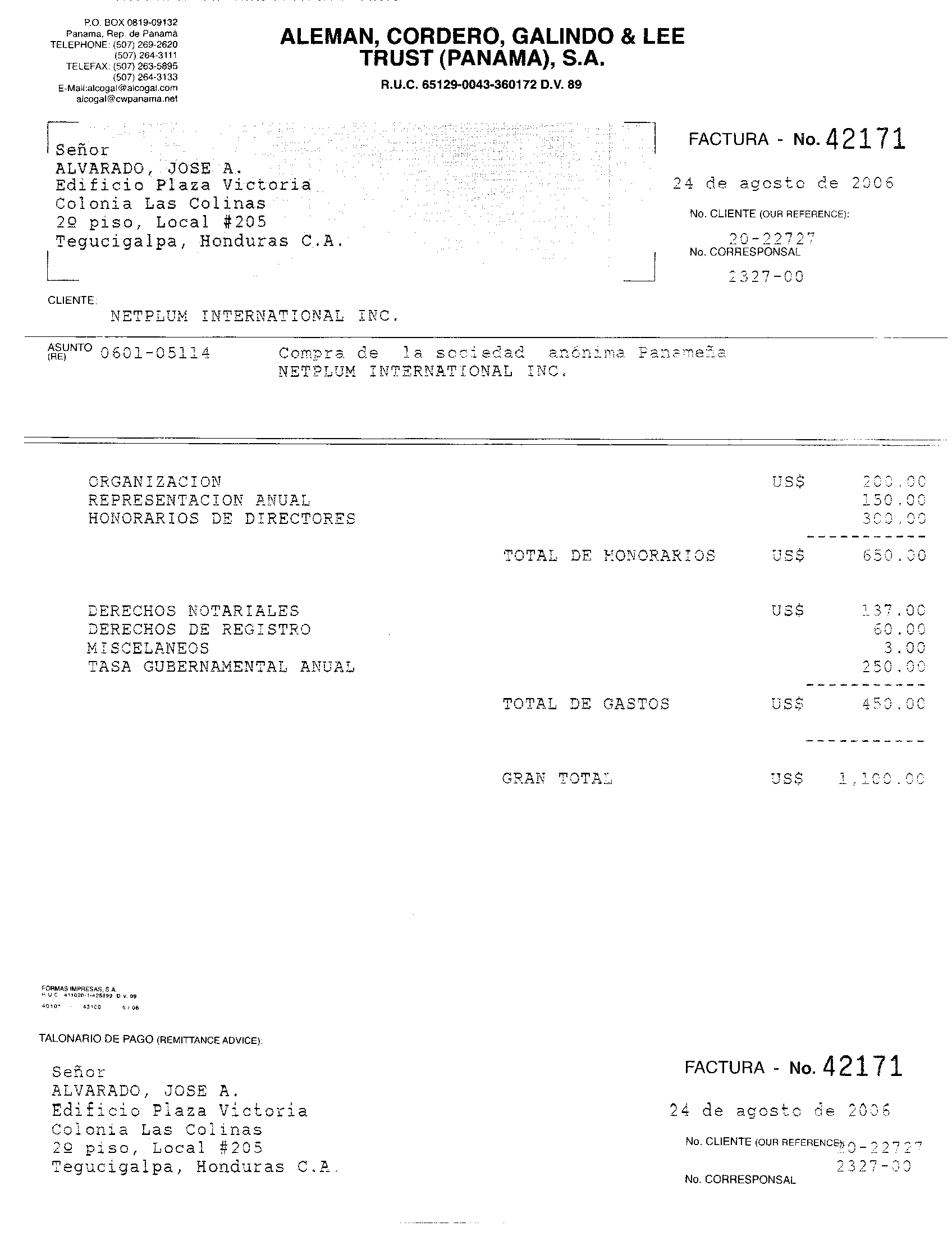
As was the case with Karlane, the address is again that of the main office of Ficohsa and again we find the name of its first financial vice-president, José Arturo Alvarado Cortés.
Moreover, Alcogal’s internal chart of companies managed by José Alvarado includes Netplum and identifies Ricardo and Lucrecia Álvarez as its shareholders.
By December 2016, six months after the vice-president was mentioned as a shareholder of Netplum, Alcogal was still sending notifications to another Banco Ficohsa executive – in this case Abdiel Antonio Fuentes in the Panama office – about decisions related to that company.
Like Nasry Asfura Zablah, according to Bustillo, former mayor Ricardo Álvarez is also not a partner of Ficohsa, but they still gave him support to manage his offshore companies. Bustillo said that he could not refer to the purpose of the creation of the offshore company linked to Álvarez, Netplum, because he did not have authorization from his client. However, he said that in both cases it was a matter of trust and support to long-standing clients of the bank. In the case of Álvarez, he even added that many years ago he was an employee of one of the companies of the group, and that maybe that is why there was a friendship.
Investigations into the two mayors
Neither Nasry Asfura nor Ricardo Álvarez have been charged or convicted by the Honduran justice system. However, authorities have made inquiries regarding their management as mayors.
In the lead up to this year’s presidential elections, Asfura has been under investigation for two separate cases.
In the first case, in October 2020, the Honduran Public Ministry requested a preliminary hearing before an anti-corruption judge against Asfura for alleged money laundering, embezzlement of public funds, fraud, use of false documents and violation of the duties of a public official. Prosecutors accused the two-time mayor of participating in a corruption scheme that would have diverted 28 million lempiras (about US$1.2 million) from the city’s coffers between 2017 and 2018. The Supreme Court admitted the pre-trial because there were indications of the participation of the mayor and one of his councilors in these alleged crimes.
According to the Public Ministry, the municipal corporation of councilors allowed the mayor to increase the entity’s revolving fund from 500,000 to 28 million lempiras. This fund provides resources to the mayor’s office for “emergent expenses.” The money came out of a trust fund that the mayor’s office of the Central District had created with Banco Ficohsa since 2006 and which is still active today.
The documents of the pre-trial admission show that the prosecutors assured that Asfura moved public money in his personal accounts, some of which he had opened only for that purpose in Ficohsa and which he later closed. They also pointed out that the mayor made payments to personnel of companies where he is a partner or where he has commercial ties, such as Cosemsa, Decoesa, Invasa and Codena. The Public Ministry documented how some activities of the mayor’s office were carried out on Cosemsa’s premises and how the employees of that company handled public funds.
However, in July of this year, the criminal chamber of the Supreme Court of Justice dismissed the request for impeachment of the Public Ministry after an appeal by Asfura’s defense team. Subsequently, the Judicial Power denied an appeal filed by the Public Ministry to reverse that decision.
By that time, Asfura was already the presidential candidate who had obtained the highest number of votes in all the party primaries. He became the candidate of the ruling party, the National Party, and is currently leading in the polls. He is not the only candidate who has been in the crosshairs of justice: his rival Yani Rosenthal, of the Liberal Party, recently paid a three-year sentence in a New York jail after pleading guilty in the Southern District Court of New York to illicit transactions related to the laundering of drug trafficking proceeds. (See article _____).
Ricardo Álvarez was mentioned in the trial against drug trafficker Geovanny Fuentes Ramírez, in which prosecutors included him among the high-ranking officials of the government of Juan Orlando Hernández who allegedly received bribes and also electoral financing for the 2013 campaign, in exchange for protection. Regarding these accusations, Álvarez told local media that they were unsubstantiated. “I categorically deny any link or receipt of money of illicit origin by Devis Rivera,” he said.
In a third case, which had not been made public until now, both Nasry Asfura and Ricardo Álvarez were under investigation by the Honduran Public Ministry and the Organization of American States (OAS) Mission of Support Against Corruption and Impunity (Maccih) between 2016 and 2019, according to a source close to the case.
It was not known because, unlike the fourteen cases that this joint investigative body presented to the justice system, this file called “Pandora Inc” was not brought before the judges. At the beginning of 2020, the government of Juan Orlando Hernández refused to renew the agreement with the OAS for the anti-corruption mission to continue its work in the country. The OAS said in a statement that, “The termination of the work of the MACCIH in Honduras is a negative development in the fight against corruption and impunity in the country.”
According to joint investigations by the Maccih mission and the Public Ministry, two different corporations of the municipality of Tegucigalpa allegedly diverted funds from the trust fund created to manage the accounts of the mayor’s office from 2006 to the present. These resources, according to investigators, passed through offshore companies and then allegedly returned to Honduras to finance political campaigns.
When Álvarez was mayor and Asfura city councilor, the Municipal Corporation of the Central District authorized the mayor to sign with Banco Financiera Comercial Hondureña, S. A. (Ficohsa) a management trust agreement (CFA). .
Bustillo explained that the experience of the trusts in the Mayor’s Office of Tegucigalpa began in the local government of the nationalist Miguel Pastor to manage a loan made by the Inter-American Development Bank to the capital city to improve water and sanitation services. Ficohsa has won two public tenders between 2006 and the present to manage Central District trusts, Bustillo said. These were intended to improve efficiency in tax collection and management of city resources. He assured that, as a result, the capital’s government has increased its tax collection from 600 million to 1.8 billion lempiras. He said that the bank has responsibly managed these public resources in a trust.
“The 2010 trust was set up with resources from a loan from with the World Bank’s International Finance Corporation,” recounted Bustillo, adding “Because the municipal government improved its management, it received 50 million to improve infrastructure. Now, every 32 days there is a new project being developed because of the better management of finances.”
He explained that the bank has been responsible and has an effective compliance department that alerts when there are suspicious movements. “We cannot refer to particular cases,” he said. “What I can tell you is that most of the investigations there have been in the country are done by reports that are made in the financial system. Without those there would be no cases.”
In an email after the interview, Bustillo reported that he asked staff to review the trust’s records and can assure with certainty that “the records of financial movements and transactions show that the Central District trust administered by Ficohsa never transferred funds abroad. Any assertion to the contrary would be an accusation far from reality.” He reiterated that trusts are supervised by the National Banking and Insurance Commission (CNBS) and in the case of public funds by the Superior Court of Accounts (TSC).
Information from Alcogal’s internal files show that both Nasry Asfura and Ricardo Álvarez managed companies in tax havens while they held high positions in the Honduran state. Neither of them answered to this journalistic alliance why they had these offshore companies or if they declared them to the tax authorities, two fundamental practices of transparency
All the more so when one of them is the first presidential appointee and the other one aspires to become president of the country for the next four years.
